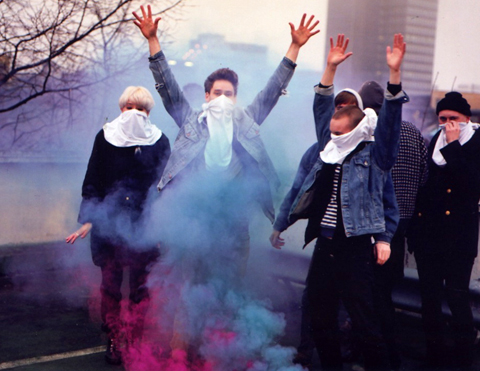
KIDS ARE UNITED While the origins of WU LYF are shrouded in mystery, the band's raw, reverb-heavy
power-pop is almost coming into focus. |
Contemporary plugged-in life is a monument to excess. There are too many things to read or watch or hear, too many interesting people on Faceblr and Twitinterest, too much of everything to swallow. This flood of information makes it comforting when a band gains hype not because of what they've said or done but what they haven't. Over the last couple of years, WU LYF (an acronym for World Unite Lucifer Youth Foundation) have reaped great rewards by cultivating an air of mystery, even if the band never intended to do so in the first place.
In 2009, someone placed music from the Manchester crew online and people dug it enough that they wanted to learn more about its creators. But the band didn't step forward. This practice both frustrated and fascinated the British press, who then took to examining and elaborating on their enigmatic qualities. To be fair, early WU LYF details (or at least what was reported) carried a vague sense of rebellion: they repeatedly turned down interview requests, they posted furtive mission statements and collages online without explanation, and their first mass-distributed photograph depicted them as a youth militia. The band stood in an urban setting with hands raised, white bandanas cloaking their faces, and smoke bombs exploding on the ground.
The press wanted more to chew on. Last April, the Guardian ran a piece reporting that WU LYF's manager was Warren Bramley, a pivotal force behind a creative studio that has developed marketing campaigns for brands such as Adidas and Virgin, with the implication that this seemingly defiant rock group was being overseen and bankrolled by a suit. Later that year, WU LYF did their first interviews, and in addition to waving off the Bramley story, front man Ellery Roberts repeatedly emphasized a major misunderstanding. "We weren't trying to present ourselves as a cool, mysterious band that nobody knows about," he told the Australian. "We were just getting on with it." Nowadays, the group do interviews regularly — bassist/vocalist Tom McClung spoke to us by phone from his UK home — but there is still good reason to think of WU LYF as cryptic, whether or not they mean to be.
 |
McClung isn't the easiest interviewee. He's all business — no laughs, no bullshitting — and speaks softly but decisively. When he clears up misconceptions, he often leaves another question behind. For example, the band weren't wearing bandanas in that image but rather T-shirts. "The masks weren't so much hiding ourselves as [they were there] to show what we thought was important: the idea that we're unified," he says. He's baffled by the much-discussed notion that the group rejected those initial interviews yet never explicitly dispels the rumor. He discusses WU LYF's logo — a "W" perched on a cross — and says that it has many connotations and works because "it stands up for itself" but doesn't explain what those connotations say.